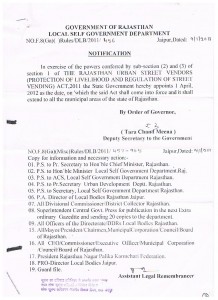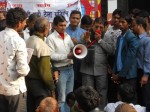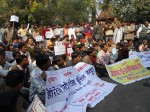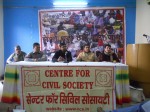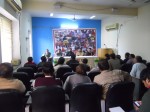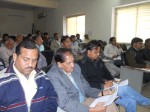Jaipur Municipal Corporation started a ten day long campaign to remove encroachment from walled city area of Jaipur from Monday, 30 April 2012. The campaign was started on basis of a report submitted by an Empowered Committee constituted by Supreme Court of India. This was 11th such cleaning drive in walled city in last 12 years, ‘Operation Pink’ being the first one in year 2000. Here are some news clips and news links regarding the eviction drive:
News Cutting
http://articles.timesofindia.indiatimes.com/2012-04-30/jaipur/31505987_1_anti-encroachment-drive-temporary-encroachments-shopkeepers
http://articles.timesofindia.indiatimes.com/2012-05-02/jaipur/31539892_1_temporary-encroachments-badi-chaupar-jmc
Once again, poor street vendors were the first victim of the anti encroachment drive instead of removing permanent encroachment by land mafias even when the state government had passed ‘Rajasthan Urban Street Vendor (Protection of Livelihood and Regulation of Street Vending) Act 2011’ and notified on 1st April 2012. The authorities tried to complete the formality of demolishing permanent encroachment by evicting poor street vendors who make their livelihood by selling fruits, vegetables and other stuffs of daily use on street.
We took up the issue very seriously and made our strategy to raise the issue of livelihood of poor street vendors and persuade JMC to find suitable solution to the issue so that the objective of beautifying the city can be attained without any loss of livelihood. In this regard CCS did several rounds of meetings with JMC officials, street vendor groups, community leaders and business group of the area to convince allowing systematic vending on street to add convenience for all. In this regard here are few major initiatives taken by CCS apart from several other things done:
1) CCS held meetings with street vendors on May 03, 2012 to organize and unite them to face or counter the eviction activity and workout a practical solution.
2) CCS participated in the meeting organized by JMC on the issue on May 03, 2012 to stand for the cause of livelihood of poor street vendors. The agenda of the meeting was to create consensus on eviction of street vendors from the walled city. We raised questions about taking vendors view point on eviction, legal parameters, and provisions of act on street vending.
3) We conducted a detailed study of the eviction area with pictures and video of the area, organized stake holder meetings and several rounds of meetings with JMC officials. We convinced all the stake holders of one particular market to allow systematic street vending to avoid traffic congestion at the same time to add convenience in the market.
4) On 17 May 2012, we gave a detailed presentation to the members of the Supreme Court Empowered Committee explaining rights of street vendors under the ‘Rajasthan Urban Street Vendor (Protection of Livelihood and Regulation of Street Vending) Act 2011’, ‘National Policy on Urban Street Vendors 2009’ and previous judgments of various courts in favor of street vendors. Justice V. S. Dave and Justice I. S. Israni liked the presentation and shared their ideas too regarding considering right to livelihood of poor street vendors as their fundamental right under the constitution. Here are some pictures during the presentation:

Supreme Court Empowered Committee Members in Discussion

Justice V. S. Dave in Discussion

Aprajita Sharma Giving Presentation

Justice V. S. Dave and I. S. Israni Watching Presentation
5) Convinced with our representation the Supreme Court Empowered Committee sent a letter to JMC asking not to evict street vendors and develop inclusive plan for street vendors according to the ‘Rajasthan Urban Street Vendor (Protection of Livelihood and Regulation of Street Vending) Act 2011’ and share it with them. The committee also mentioned in the letter that the JMC can seek help of CCS in this matter. Here is copy of the letter:
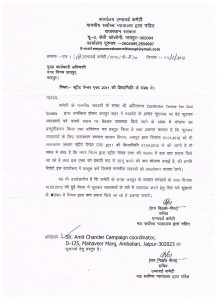
Letter of Empowered Committees
6) Taking cognizance of our meetings, raising the issue and getting the empowered committee notice, the JMC decided to allow street vendor to vend from the same place and not evict. Here is a news clip reading the same:
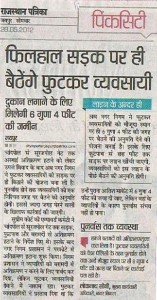
News Cutting














